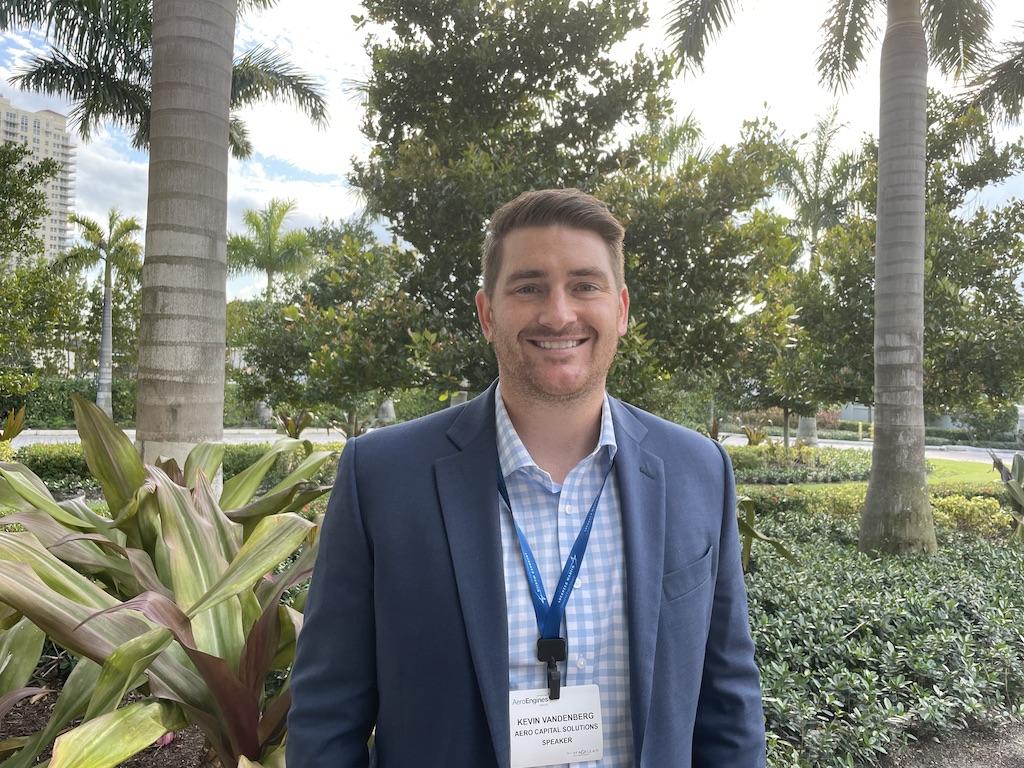
Kevin VanDenBerg, Aero Capital Solutions (ACS) senior VP asset management, spoke with Lee Ann Shay on Jan. 27 on the sidelines of Aviation Week’s Aero-Engines Americas about trends in aircraft and engine leasing. He joined ACS in May 2019 and previously was VP of acquisitions and contracts at Delta Material Services.
Aero Capital Solutions specializes in mid-life commercial aircraft. Are you having any challenges getting the feedstock at the right prices?
We've seen Boeing 737-800 pricing stabilize really quickly. The 737-700 pricing dropped off pretty rapidly after the pandemic started and has not recovered—and probably won't fully recover. The -700s were probably the oldest, and in a lot of fleets, the easiest to retire. The resale value on the part outs has just dropped off significantly. The -800s stabilized because they were immediately buoyed by the freighter program.
We kicked off our 737-800 freighter conversion line, the Aeronautical Engineering Inc. (AEI) STC, in 2020 and I believe we are the largest holder of AEI -800 conversion slots in the world. We've done six to date, we'll do 13 in 2022 and we have slots lined up through 2024. The initial feedstock were our own aircraft that we took back at the beginning of the pandemic. We were pretty proactive on early returns. We were uniquely positioned because we didn't have a lot of term left on a lot of our leases, so the deferral conversations weren't as pertinent to us. It was more about security deposits and redelivery conditions. We were quick to take our aircraft back.
We had already been exploring the -800 (conversion) space, but we pivoted and executed a new line of business with our own feedstock. We've been buying an -800 or two every month from various sources—including operators and other lessors.
The other part of our core business historically has been focusing on single-aisle [Airbus] A320 family and 737NGs for passenger leasing. We have more than 100 aircraft now and those are primarily passenger aircraft that have an average of 3-4 years left in their term. We're continuing to originate aircraft on lease, but we’re also open to off-lease aircraft acquisitions and engine acquisitions, if they make strategic sense for the business.
What’s the timeframe for the 13 Boeing 737-800 passenger freighter conversions for 2022?
We have four in work-in-progress and we’ll do another nine this year.
What’s the sweet spot for 737-800 pricing for conversion?
I can’t reveal that, but I’d say the AEI STC (for passenger to freighter conversion) is slightly cheaper than the Boeing equivalent. We also found the AEI STC to be very flexible and suited to our business needs and our customer base. For feedstock, a lot of the value is still in the engines. Our target engine is anywhere from 3,500-6,000 cycles remaining, which is the sweet spot for our operators. That would be a 6-10 year term in most cases.
ACS says it’s known for providing services that allow for maintenance avoidance. How?
The end game in a lot of cases is building our engine leasing pipeline. So when we take our aircraft back, we're usually very hands on and flexible when we do aircraft redeliveries. A lot of times that results in us harvesting green-time engines and so we have a significant quantity now of CFM56-7B and -5Bs, V2500s and a couple 100-in. Pratt 4000s as well, but that's one of the core business lines of ACS. We take mechanical risk. We take a very flexible approach. We design leasing programs or individual leases around what our customers are asking for.
Any nuances to what customers are asking this year so far?
What we've seen is that most major airlines are concerned about the lack of clarity on what the MRO supply chain and used serviceable material looks like. They are fairly limited in making commitments and wanting to make sure they have an opportunity to lock up supply. It's an interesting kind of dance right now.
Everyone wants to know where the engines are, but based on a uncertainty around Omicron and what load factors and flying looks like until this summer, many operators are cautious to pull the trigger. But we're pretty optimistic that we're going to see really strong CFM leasing throughout this year. We've seen a lot of demand on the -7B and some on the -5Bs, and some on the V2500s, but by the nature of this space, everything is a little bit reactive at the moment and everyone is a little bit gun shy and hesitant. Operators can end up in fleet analysis paralysis. But once you see the real demand signal, everybody will already be behind and so MRO shops start filling up and part-out engines move—but the first thing is everyone looks to green-time leasing. We're very optimistic that that's going to be very strong. I think engine lease rates will recover to pre-pandemic levels within the year.





